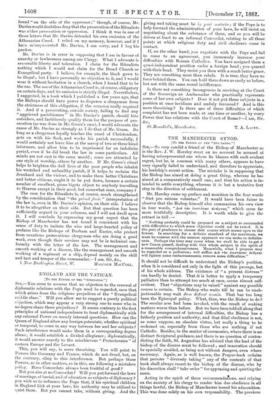ENGLAND AND THE VATICAN.
[To THE EDITOR OF THE " SPECTATOR."
SIR,—You seem to assume that no objection to the renewal of diplomatic relations with the Pope need be regarded, save that which arises from the religious prejudices of the "Evangelical middle class." Will you allow me to suggest a purely political objection, which may appear a very strong one to some who in no degree share those prejudices ? It seems contrary to the first principles of national independence to treat diplomatically with any external Power on merely internal questions. How can the Queen of England allow any foreign potentate, whether spiritual or temporal, to come in any way between her and her subjects ? Such interference would make them in a corresponding degree aliens ; it would establish a divided allegiance ; diplomatically, it would answer exactly to the mischievous " Protectorates " of eastern Europe and the Levant.
This, you will say, is mere theorising. You will point to Powers like Germany and France, which do not dread, but, on the contrary, cling to this interference. But perhaps those Powers, as in other matters, so in this, are following a mistaken policy. Have Concordats always been fruitful of good P But you aim at no Concordat ? Will you put forward the laws of marriage, of burial, and of education as subjects of diplomacy P you wish so to influence the Pope that, if his spiritual children in England kick at your laws, his authority may be utilised to quiet them. But you cannot take, without giving. And the
giving and taking must be in purl muteria ; if the Pope is to help forward the administration of your laws, he will insist on negotiating about the substance of them, and so you will be driven at least to an informal Concordat, relating to all those points at which religious duty and civil obedience come in contact.
If, on the other hand, you negotiate with the Pope and fail to come to an agreement, you immensely increase your difficulties with Roman Catholics. You have assigned them a quasi-independent position under a foreign head ; you quarrel with their head. They resist you then with a much better grace. They are something more than rebels. It is true, they have no force behind them. You can hold them down as easily as before, but not with the same moral indifference.
Is there not something incongruous in receiving at the Court of the Sovereign an Ambassador who practically represents some of her own subjects ? Does it not put those subjects in a position at once invidious and unduly favoured P And is this mere theorising ? Is there qne of these difficulties of which complaint has not been made, at one time or another, by every Power that has relations with the Court of Rome ?—I am, Sir..










































 Previous page
Previous page